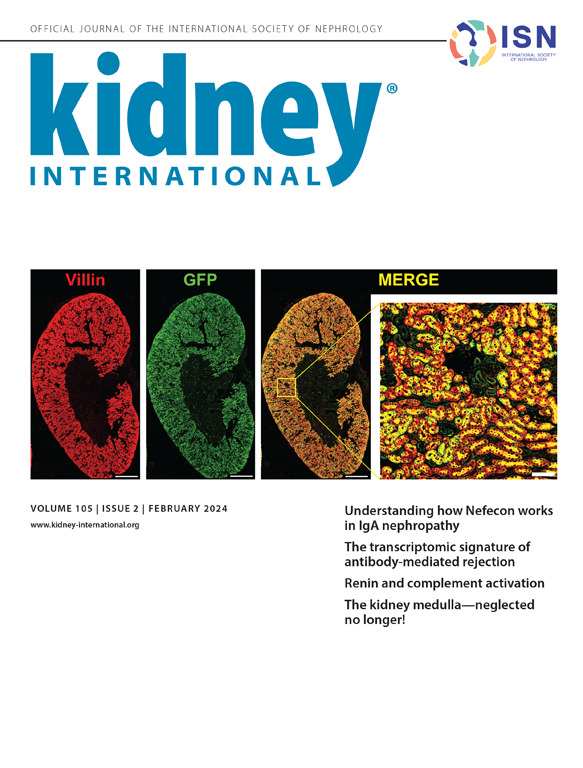扩大了血栓性微血管病中dna特异性外切酶trex1变异的遗传原因谱。
IF 12.6
1区 医学
Q1 UROLOGY & NEPHROLOGY
引用次数: 0
摘要
血栓性微血管病(TMA)是一种复杂的疾病,涉及内皮损伤和微血管血栓。国际肾脏病学会的溶血性尿毒综合征国际论坛确定,基因变异对于血浆交换和抗补体治疗等量身定制的治疗至关重要。最近的研究表明,新的致病基因超越补体和凝血途径有助于TMA,包括TREX1变异。TREX1蛋白是一种DNA特异性核酸外切酶,通过降解受损的细胞质DNA来维持基因组完整性并调节免疫反应。破坏TREX1内质网锚定的变异可导致血管病变。方法:我们对53例TMA患者、94例IgA肾病合并微血管病变患者、25例C3G肾小球病变患者和20例anca相关血管炎患者进行了回顾性计算机研究。结果在5.7%的TMA患者和3.2%的IgA肾病微血管病变患者中发现TREX1的致病变异,但在C3肾小球病变或anca相关血管炎中未发现TREX1的致病变异。结论我们的研究强调TREX1变异在微血管疾病中的重要性,特别是在血栓性微血管病变和IgA肾病中。TREX1在基因组完整性和免疫调节中的关键作用可能为治疗提供新的治疗途径。本文章由计算机程序翻译,如有差异,请以英文原文为准。

Expanding the spectrum of genetic causes of DNA-specific exonuclease TREX1 variants in thrombotic microangiopathy
Introduction
Thrombotic microangiopathy (TMA) is a complex condition involving endothelial damage and microvascular thrombi. The International Society of Nephrology’s aHUS International Forum identified genetic variants as crucial for tailored therapies like plasma exchange and anti-complement therapy. Recent studies suggested that new pathogenic genes beyond complement and coagulation pathways contribute to TMA including TREX1 variants. The protein TREX1, a DNA-specific exonuclease, maintains genome integrity and regulates immune responses by degrading damaged cytosolic DNA. Variants disrupting TREX1’s endoplasmic reticulum anchoring can lead to vasculopathy.
Methods
We conducted retrospective in silico studies involving 53 patients with TMA, 94 with IgA nephropathy with microangiopathic lesions, 25 with C3G glomerulopathy and 20 with ANCA-associated vasculitis.
Results
Pathogenic variants of TREX1 were found in 5.7% of patients with TMA and 3.2% of patients with IgA nephropathy with microangiopathic lesions, but none in C3 glomerulopathy or ANCA-associated vasculitis.
Conclusions
Our study highlights the importance of TREX1 variants in microvascular diseases, particularly in thrombotic microangiopathy and IgA nephropathy. TREX1’s critical role in genome integrity and immune regulation may offer new therapeutic avenues for treatment.
求助全文
通过发布文献求助,成功后即可免费获取论文全文。
去求助
来源期刊

Kidney international
医学-泌尿学与肾脏学
CiteScore
23.30
自引率
3.10%
发文量
490
审稿时长
3-6 weeks
期刊介绍:
Kidney International (KI), the official journal of the International Society of Nephrology, is led by Dr. Pierre Ronco (Paris, France) and stands as one of nephrology's most cited and esteemed publications worldwide.
KI provides exceptional benefits for both readers and authors, featuring highly cited original articles, focused reviews, cutting-edge imaging techniques, and lively discussions on controversial topics.
The journal is dedicated to kidney research, serving researchers, clinical investigators, and practicing nephrologists.
 求助内容:
求助内容: 应助结果提醒方式:
应助结果提醒方式:


